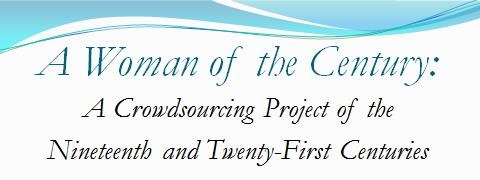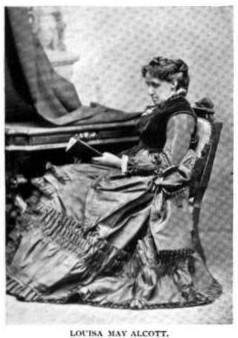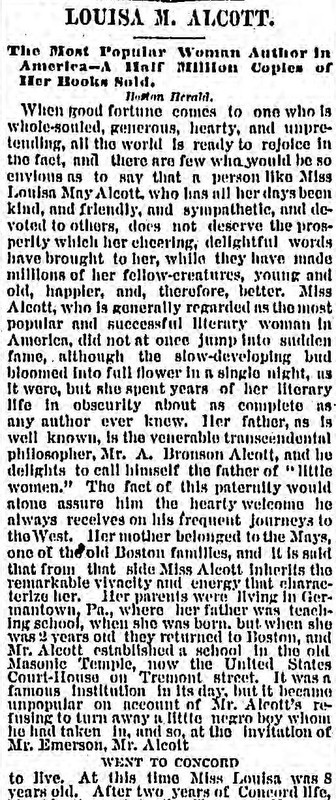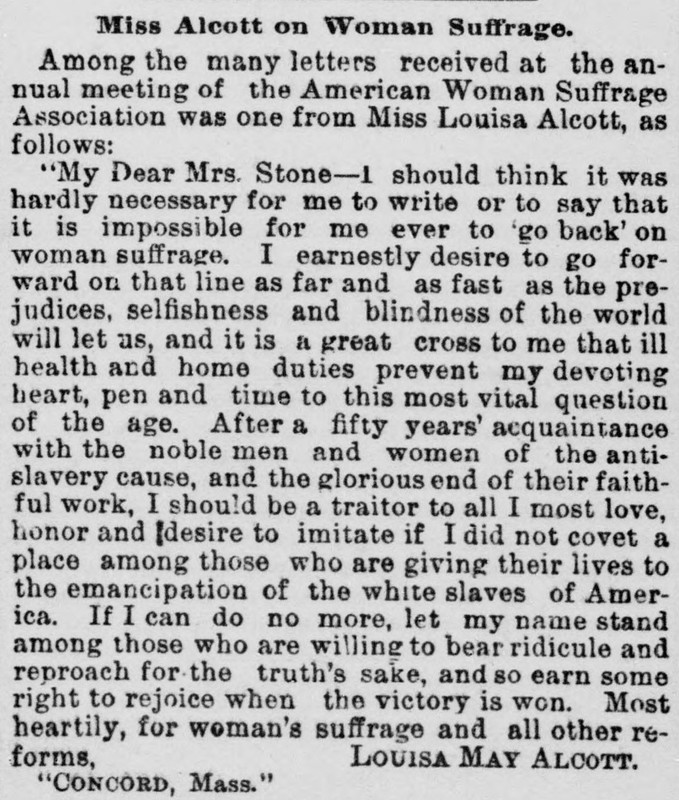Dublin Core
Title
Description
Louisa May Alcott, author of Little Women and several other books, was born in Germantown, PA on November 29, 1832, but she spent most of her life in Concord, MA.
Alcott lived in Boston with her family during her youth and moved with them to Harvard where her father, transcendentalist Amos Bronson Alcott, had formed the Fruitlands community. Later, the family moved back to Concord. During the Civil War, Louisa worked as a nurse in Washington, D.C. While an illness halted her service shortly after it had started, the experience was the inspiration for Hospital Sketches (1863). James Redpath, her publisher, also published her On Picket Duty, and Other Tales the next year.
During her career, Louisa wrote numerous books under her own name and several thrillers under her pseudonym, A. M. Barnard. Her most famous book was Little Women published by Roberts Brothers in 1868. This book was illustrated by her sister May Alcott Nieriker, an artist whose profile is in A Woman of the Century. Louisa also edited Merry's Museum from 1868 to 1879 and wrote pieces for periodicals such as The Atlantic Monthly and The Independent.
Louisa's extensive social network included authors Ednah Dow Cheney, Ralph Waldo Emerson, Elizabeth Powell Bond, Henry David Thoreau, and her uncle, reformer Samuel Joseph May.
By 1883, Louisa was living in Concord and caring for both her elderly father and her niece Lu, whose mother May had passed away shortly after her birth. The Indianapolis Journal reprinted Louisa's letter to Lucy Stone that while she was interested in woman's suffrage, her family obligations prevented her from attending the Woman's Suffrage National Convention. Louisa also expressed her frustration at the lack of interest in the topic by many of Concord's women and hoped that the women at the Convention could help to provide motivation for "these slothful sisters." Later that year, Louisa was one of ten women who sent a joint letter to the Massachusetts and Republican State Central Committees. As The Greenville Times notes, "They believe that the establishment of political rights for women is essential to the highest good of the state." The other women were Lucy Stone, Julia Ward Howe, Mary G. Ames, Mary A. Livermore, Mary F. Eastman, Ednah D. Cheney, Mary C. Shannon, Mary Shannon, and Susan E. B. Channing. Louisa continued to support the cause during the 1880s.
She passed away on March 6, 1888 at age fifty-five and was buried in Sleepy Hollow Cemetry in Concord, MA.
Alcott lived in Boston with her family during her youth and moved with them to Harvard where her father, transcendentalist Amos Bronson Alcott, had formed the Fruitlands community. Later, the family moved back to Concord. During the Civil War, Louisa worked as a nurse in Washington, D.C. While an illness halted her service shortly after it had started, the experience was the inspiration for Hospital Sketches (1863). James Redpath, her publisher, also published her On Picket Duty, and Other Tales the next year.
During her career, Louisa wrote numerous books under her own name and several thrillers under her pseudonym, A. M. Barnard. Her most famous book was Little Women published by Roberts Brothers in 1868. This book was illustrated by her sister May Alcott Nieriker, an artist whose profile is in A Woman of the Century. Louisa also edited Merry's Museum from 1868 to 1879 and wrote pieces for periodicals such as The Atlantic Monthly and The Independent.
Louisa's extensive social network included authors Ednah Dow Cheney, Ralph Waldo Emerson, Elizabeth Powell Bond, Henry David Thoreau, and her uncle, reformer Samuel Joseph May.
By 1883, Louisa was living in Concord and caring for both her elderly father and her niece Lu, whose mother May had passed away shortly after her birth. The Indianapolis Journal reprinted Louisa's letter to Lucy Stone that while she was interested in woman's suffrage, her family obligations prevented her from attending the Woman's Suffrage National Convention. Louisa also expressed her frustration at the lack of interest in the topic by many of Concord's women and hoped that the women at the Convention could help to provide motivation for "these slothful sisters." Later that year, Louisa was one of ten women who sent a joint letter to the Massachusetts and Republican State Central Committees. As The Greenville Times notes, "They believe that the establishment of political rights for women is essential to the highest good of the state." The other women were Lucy Stone, Julia Ward Howe, Mary G. Ames, Mary A. Livermore, Mary F. Eastman, Ednah D. Cheney, Mary C. Shannon, Mary Shannon, and Susan E. B. Channing. Louisa continued to support the cause during the 1880s.
She passed away on March 6, 1888 at age fifty-five and was buried in Sleepy Hollow Cemetry in Concord, MA.
Contributor
Coverage
Person Item Type Metadata
Page(s) in WOC
Name in WOC
Birth Name
WorldCat Identity
Gender
Birth Date
Birth Year
Generation
Birthplace
State or Country of Birth
Nationality
Lived or Visited Abroad
Marital Status
Occupation(s) in WOC
Organization
Publication
Alcott, Loisa M. Moods. Boston: Loring, 1865. In Haithi Trust
Alcott, Louisa May. Rose In Bloom: A Sequel o "Eight Cousins." Boson: Robets Brothers, 1876. In Haithi Trust
Alcott, L. M. Hospital Sketches. Boston: James Redpath, 1863. In Haithi Trust
Publisher
Places Resided
Location (Address, City/Town, State [if USA] or Country)
Personal Network
Death Date
URL
Bibliography
- The Salt Lake herald. (Salt Lake City [Utah), 25 March 1888. Chronicling America: Historic American Newspapers. Lib. of Congress. <http://chroniclingamerica.loc.gov/lccn/sn85058130/1888-03-25/ed-1/seq-15/>
- The Vancouver independent. (Vancouver, W.T. [Wash.]), 03 Jan. 1878. Chronicling America: Historic American Newspapers. Lib. of Congress. <https://chroniclingamerica.loc.gov/lccn/sn87093109/1878-01-03/ed-1/seq-7/>
- Chicago daily tribune. [volume] (Chicago, Ill.), 21 May 1880. Chronicling America: Historic American Newspapers. Lib. of Congress. <https://chroniclingamerica.loc.gov/lccn/sn84031492/1880-05-21/ed-1/seq-11/>
- The Indianapolis journal. [volume] (Indianapolis [Ind.]), 27 Jan. 1883. Chronicling America: Historic American Newspapers. Lib. of Congress. <https://chroniclingamerica.loc.gov/lccn/sn82015679/1883-01-27/ed-1/seq-4/>
Item Relations
| This Item | Contributor | Item: Atlantic Monthly |
| This Item | Contributor | Item: Independent |
| This Item | knows | Item: STONE, Mrs. Lucy |
| Item: CHENEY, Mrs. Ednah Dow | knows | This Item |
| Item: BOND, Mrs. Elizabeth Powell | knows | This Item |



